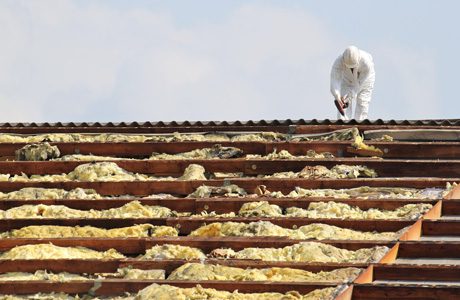
SGS UK, a company focused on inspection, verification, testing and certification, is offering training to help employees avoid exposure to asbestos to and manage the recovery and clearance processes. Asbestos is the UK’s number one work-related killer responsible for the death of approximately 20 tradespeople per week.
Five new SGS Academy courses (ranging from half to full day workshops) are designed to provide staff with an active awareness of the hazards of asbestos in the workplace and how to respond properly to a disturbance.
What the courses cover
Paul King, Technical Manager for SGS MIS Environmental said the training courses “cover everything from what asbestos is and where you find it, to what the health effects are and how you go about safely managing it.”
Asbestos awareness training is mandatory for anyone in the UK who might come into contact with it throughout the course of their daily work and the SGS Category A course: ‘Asbestos – statutory awareness’ gives participants the knowledge of how to work safely without exposing themselves or others to asbestos. It also provides instruction on how to avoid carrying out work that may disturb asbestos fibres.
Additional training is required for those employees who intend to carry out either non-licensed or notifiable non-licensed work (NNLW) that could potentially disturb asbestos.
“Our other course (Category B: Asbestos –practical work with asbestos) involves practical training to teach participants how to safely carry out minor-risk asbestos work. It also provides an overview of the requirements of the Control of Asbestos Regulations (CAR) 2012.”
Paul King believes, “Asbestos training is vital for anyone who has even the slightest chance of coming into contact with it. Every year there are around 5,000 related deaths. In fact, you’re more likely to die from asbestos than falling off a ladder or electrocution. The whole point of training is to find the safest methods of avoiding or working around asbestos so that no one has to breathe it in.”
No obvious cues to exposure
Asbestos has been dubbed the “hidden killer” and according to Mr King, “the problem is that there’s no natural learning process – you don’t experience any symptoms at the time of exposure, which is why training is so crucial. It replaces the natural awareness that you’d usually get from something like stubbing your toe or falling from a height so that you know what signs to look out for and how to deal with it.”
SGS offers a range of different options for companies wishing to undertake courses. “In addition to our public portfolio we also offer E-learning and can custom-make courses to fulfil a company’s specific requirements,” said Daniel Curling, Manager of the SGS Academy.
SGS is UKAS accredited for a number of asbestos services. “We have years of extensive experience in asbestos management, inspection, air monitoring, surveying, site audits and soil analysis. Our course trainers are practitioners who have dealt with asbestos on a daily basis. They understand the impact of asbestos on both an individual and business level and can harness this knowledge to help clients appreciate the dangers and build a resilient management plan,” said Mr Curling.







